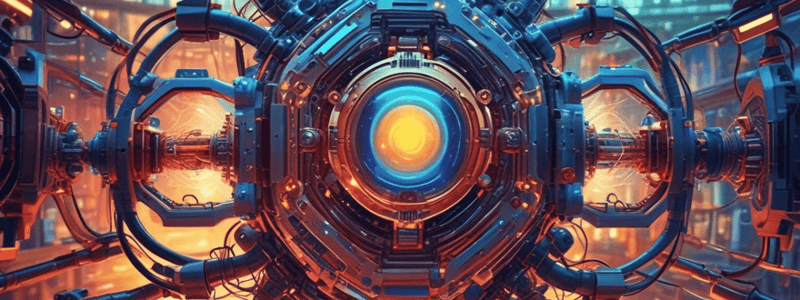Podcast
Questions and Answers
Wat is een van de uitdagingen die moeten worden overwonnen voordat quantumcomputers wijdverbreid kunnen worden gebruikt?
Wat is een van de uitdagingen die moeten worden overwonnen voordat quantumcomputers wijdverbreid kunnen worden gebruikt?
- Het gebrek aan interesse in quantumcomputers
- De beperkte beschikbaarheid van quantumcomputers
- Het gebrek aan rekenkracht van quantumcomputers
- De complexiteit van quantumtechnologie (correct)
Wat is een kenmerk van robots die worden aangedreven door kunstmatige intelligentie?
Wat is een kenmerk van robots die worden aangedreven door kunstmatige intelligentie?
- Ze hebben menselijke intelligentie
- Ze kunnen niet leren of zich aanpassen
- Ze kunnen leren van hun omgeving en zich aanpassen (correct)
- Ze hebben geen programmering nodig
Wat is een beperking van kunstmatige neurale netwerken?
Wat is een beperking van kunstmatige neurale netwerken?
- Ze zijn niet geïnspireerd door de structuur en functie van de menselijke hersenen
- Ze kunnen geen patronen en relaties in data leren
- Ze begrijpen altijd de context van de data die ze verwerken
- Ze hebben moeite met het begrijpen van de context van de data die ze verwerken (correct)
Wat heeft veelbelovende ontwikkelingen getoond in het overwinnen van beperkingen van kunstmatige neurale netwerken?
Wat heeft veelbelovende ontwikkelingen getoond in het overwinnen van beperkingen van kunstmatige neurale netwerken?
Welk veld zal naar verwachting een diepgaande invloed hebben op onze manier van leven en werken?
Welk veld zal naar verwachting een diepgaande invloed hebben op onze manier van leven en werken?
Study Notes
Artificial Intelligence and Future Technologies
Machine Learning
Machine learning is a subset of artificial intelligence that involves the use of algorithms to enable computers to learn from data and make predictions or decisions based on that data. It is a powerful tool that can be used in a variety of applications, from image recognition to natural language processing. Machine learning algorithms can be broken down into three main types: supervised, unsupervised, and reinforcement learning.
Supervised learning involves training a model on labeled data, where the correct answer is provided for each input. The model learns to predict the correct answer for new, unseen data. Unsupervised learning, on the other hand, involves training a model on unlabeled data, where the model must find patterns and relationships in the data on its own. Reinforcement learning involves training a model to make decisions based on feedback from its environment.
Quantum Computing
Quantum computing is a type of computing that leverages the principles of quantum mechanics to perform calculations. Quantum computers use quantum bits, or qubits, which can exist in multiple states simultaneously. This property, known as superposition, allows quantum computers to perform certain calculations much faster than classical computers.
Quantum computing has the potential to revolutionize many fields, including cryptography, optimization, and machine learning. However, it is still a relatively new and complex technology, and there are many challenges to overcome before quantum computers can be widely used.
Robotics
Robotics is the field of engineering that deals with the design, construction, and operation of robots. Robots can be programmed to perform a wide range of tasks, from manufacturing and assembly to exploration and research.
Advances in robotics technology have led to the development of increasingly sophisticated robots, capable of performing tasks that were previously thought to require human-level intelligence. These robots are often powered by artificial intelligence, allowing them to learn from their environment and adapt to new situations.
Artificial Neural Networks
Artificial neural networks (ANNs) are a type of machine learning model inspired by the structure and function of the human brain. ANNs consist of layers of interconnected nodes, or neurons, that process and transmit information.
ANNs can be trained on large datasets to learn patterns and relationships in the data. They have been used in a wide range of applications, from image recognition to natural language processing.
Despite their successes, ANNs have limitations, particularly in their inability to understand the context of the data they are processing. Recent developments in deep learning, a subset of ANNs, have shown promise in overcoming these limitations.
Conclusion
Artificial intelligence and its related technologies, such as machine learning, quantum computing, robotics, and artificial neural networks, are rapidly advancing fields that hold great promise for the future. As these technologies continue to evolve and improve, they will have a profound impact on the way we live, work, and interact with the world around us.
Studying That Suits You
Use AI to generate personalized quizzes and flashcards to suit your learning preferences.




